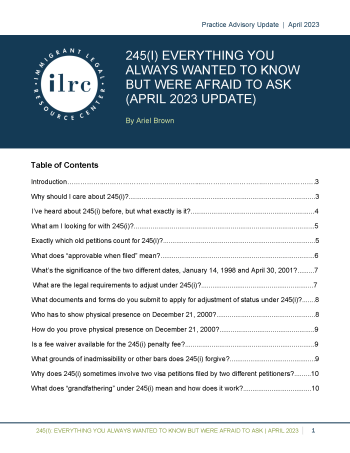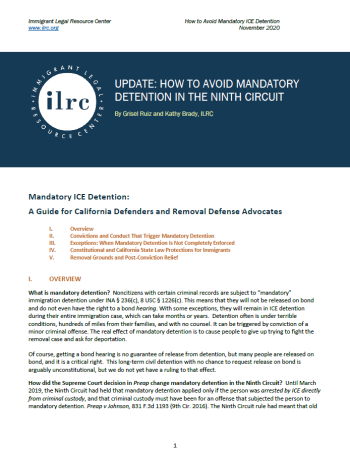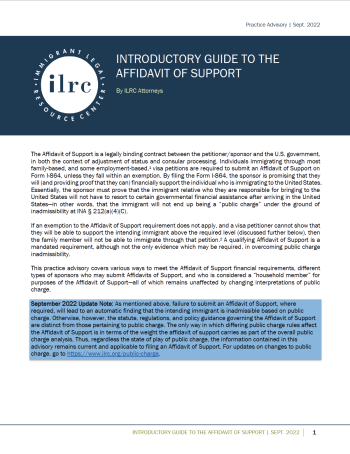
This introductory practice advisory explains 245(i), including “grandfathering” and “after acquired,” and includes screening questions to assist in identifying and evaluating possible 245(i) options for your clients.
The domestic violence deportation ground at INA § 237(a)(2)(E) sets out four bases for deportability. Recent Board of Immigration Appeals and federal decisions, including the Supreme Court decision in Sessions v. Dimaya, significantly affect each of the four bases. This advisory will provide a brief overview of the deportation ground, and then outline the recent decisions and how they may affect representation in California and the Ninth Circuit. It includes an appendix analyzing common California offenses as crimes of violence.
Cancellation of removal for Non–Permanent Residents under INA § 240A(b)(1) is a critical defense to deportation available to certain non-citizens with family in the United States. A person who is granted non-LPR cancellation of removal receives a green card, but the eligibility requirements for non-LPR cancellation are distinct from other means of applying for a green card, and also from other types of cancellation of removal. It is important for immigration practitioners to be familiar with non-LPR cancellation, as it may be the only form of immigration relief available for many people in removal proceedings who entered the United States without inspection. This practice advisory will walk through the basic requirements to help practitioners screen for cancellation eligibility.
This practice advisory discusses how the Child Status Protection Act protects children of asylees and refugees through the immigration process, including the asylum application, the Form I-730, and adjustment.

Noncitizens with certain criminal records are subject to mandatory immigration detention under INA § 236(c), 8 USC § 1226(c). This means that they may remain detained during the weeks, months, or years of their entire immigration case, without even the right to a bond hearing. Recent Supreme Court decisions in Jennings v. Rodriguez and Nielsen v. Preap have made the situation even worse, although litigation has produced some protections. This advisory outlines how to identify whether your client may be subject to mandatory detention, and what immigration advocates and criminal defense counsel can do to help their clients to avoid it.
The final step in the naturalization process is the oath of allegiance to the United States. The oath demonstrates loyalty to the United States and the Constitution. All applicants must demonstrate that they are “attached to the principles of the Constitution of the United States and well disposed to the good order and happiness of the United States.” The oath also includes statements that the applicant is willing to “bear arms on behalf of the United States,” and “perform noncombatant service in the Armed Forces” when required by law.

This advisory provides an introduction to the Affidavit of Support including various ways to meet the financial requirements, different types of sponsors who may submit Affidavits of Support, who is considered a “household member” for purposes of the Affidavit of Support, and exemptions to the Affidavit of Support.
In October 2017, the Department of Defense issued new policies that impact lawful permanent residents and other non-U.S. citizens in the military. This practice advisory discusses how these policies affect those who seek to enlist, and those who currently serve in the military, including in the Reserve Components. This practice advisory was jointly authored by the Immigrant Legal Resource Center, the National Immigration Forum, and the New Americans Campaign.
Immigration law has its own definition of what constitutes a criminal "conviction." Because most, although not all, immigration consequences require a conviction, if your client does not have a conviction the immigration case might be saved. This Advisory discusses which dispositions that come out of criminal court actually constitute a conviction for immigration purposes, and how to avoid a conviction. It has been updated to include the BIA's decision that a conviction on direct appeal of right does not have sufficient finality to be a conviction for immigration purposes.
In a time of increased immigration enforcement, advocates must consider all possible forms of relief for clients facing deportation. U nonimmigrant status (also frequently referred to as a “U visa”) is commonly pursued as an affirmative immigration benefit for undocumented individuals, but it may also be a particularly important form of removal defense for certain lawful permanent residents (LPRs) facing deportation, likely on the basis of criminal convictions. This Practice Advisory provides an introduction to U nonimmigrant status and details its benefits for LPRs facing deportation, as well as the particular issues LPRs may face in seeking this form of protection.